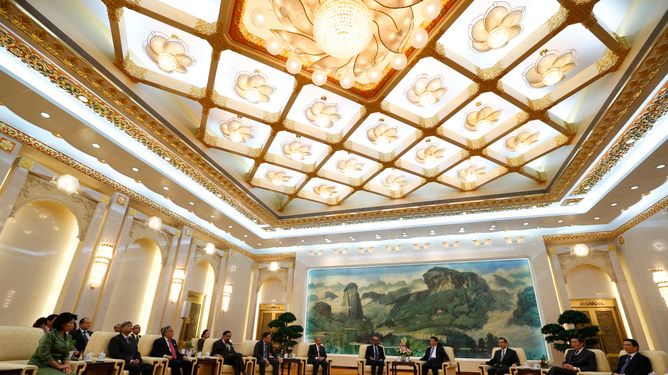
Press release -
COMMENT: Why everyone’s joining the Asian Infrastructure Investment Bank
Professor Yu Xiong, examines China’s leadership of a new global financial institution
China’s leadership of a new global financial institution, the Asian Infrastructure Investment Bank (AIIB) is proving divisive. This month has seen a number of European countries apply to be founding members, including the UK, France and Germany, to the chagrin of the US. Now, however, the US is proposing that the bank work in a partnership with the development institutions where it takes the lead, such as the World Bank and Asian Development Bank.
China and 20 other Asian countries agreed to establish the AIIB in October 2014. As the name suggests, its focus will be on funding infrastructure development projects in Asia – where there is still significant need for investment. China is leading the initiative and would like the headquarters to be based in Beijing (though Indonesia has also staked a claim to this).
While China is taking the lead in funding the bank, it has emphasised a desire for other members – which include India, Kuwait and Qatar – to participate. To this extent, China has reduced its proposed share from 50% to 20% and given up its veto power (which the US retains in the World Bank). There is also a great deal of scope for working with existing global financial institutions, with the head of the IMF Christine Lagarde recently expressing a desire to cooperate with the AIIB.
One belt, one road
There is, however, a clear political and strategic dimension to the creation of the AIIB and the reaction of the US to its allies' involvement. The US lobbied hard for its allies not to join the initiative and the White House signalled clear unease at Britain’s decision to join it last week.

Global competitors EPA/How Hwee Young
The decision of many of the US’s allies to join speaks of China’s global influence. No other country has the capital to establish such a bank and garner the support of so many countries. There have been many moments in China’s economic rise, but this may mark another historic point of China’s global influence surpassing the US and the US losing out on future investment and influence opportunities.
The AIIB will help China’s new development strategy of“One belt, one road”, which aims to bring China to world power status and enhance its political and economic impact on both Asia and the EU. With key US allies – including Korea and Japan in Asia and the UK, France and Germany in Europe – joining the AIIB, China will chalk this up as a win in the race for global influence.
Need for another bank?
The biggest difference between the AIIB and existing international financial institutions is who its shareholders are. The World Bank is responsible for providing assistance to developing countries across the world and its president is nominated by the US president and is usually American. The Asian Development Bank, meanwhile, focuses on Asia, but is dominated by Japan (all presidents having been Japanese) and the US, who are the largest shareholders.
Although China is a member of both the World Bank and the Asian Development Bank, it has no actual influence. Establishing the AIIB and having the largest tranche of shares in it means that China will have the main influence, lessening US control of the international financial system.
There is also room for another bank in terms of the amount of infrastructure that is still needed in Asia. The Asian Development Bank forecast back in 2010 that there is US$8 trillion demand for infrastructure funding up until 2020and the current levels of investment provided by the World Bank and Asian Development are far from enough to meet this. Plus, competition is good for development lending, as well as other markets.
Enduring appeal
The cascade of European countries looking to join reflects a recognition that China is a reliable and responsible collaborator and a belief that it will be a world power for the foreseeable future. China has the world’s second largest economy, the largest population and foreign exchange reserves and huge consumer purchasing power.
It is therefore extremely beneficial for European countries to enhance their relations with China, especially with their ongoing economic difficulties. Members of the AIIB will have access to the significant investment that accompanies it. For this reason, the British prime minister, David Cameron, said that it was in Britain’s national interest to become a founding member.
![]()
This article was originally published on The Conversation. Read the original article.
Categories
Northumbria is a research-rich, business-focussed, professional university with a global reputation for academic excellence. To find out more about our courses go towww.northumbria.ac.uk
If you have a media enquiry please contact our Media and Communications team at media.communications@northumbria.ac.uk or call 0191 227 4571.

